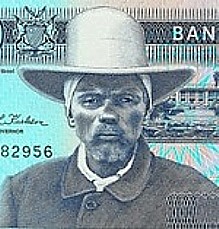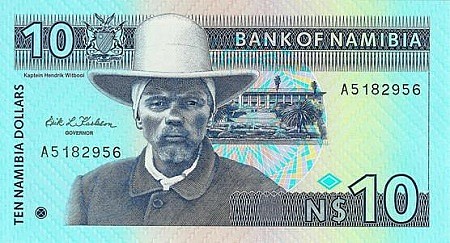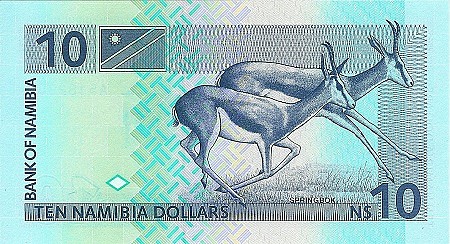NAMIBIA
Hendrick Witbooi

Hendrick Witbooi was a Namaqua (Nama) chief. The Nama are the largest group of the Khoikhoi people. The Khoikhoi people have mostly disappeared except for the Namas. The Nama led by the Witbooi’s were so called because of their unique white head-scarves. Early European colonists referred to them as Hottentots, a derisive term for the native southern Africans. The term Hottentots is derived from a northern Dutch dialect meaning to stutter. This name was given to them because of the clicking sounds that the southern African languages employed.
Born to the west of the Fish River in what is now Namibia, Hendrik Witbooi descended from a family of important chiefs of the Nama people. German missionaries were responsible for his education, and he became proficient in many different languages of the European continent. As a great guerilla fighter, Hendrik Witbooi earned the name of Khaob Nanseb Gabemab, meaning “the captain who disappears in the grass.”
The Namas under the Witbooi chiefs were known to fight with other Nama peoples and the Herero tribes. The Herero are a group belonging to the Bantu peoples, who had been in Namibia as herdsmen before the arrival of the Nama. After one battle with the Herero, Hendrik Witbooi had received a Godly vision that instructed him to lead his people north.
Against his father’s wishes, on the 16th of May in 1884, Hendrik Witbooi took a contingent of the Nama north. Though he and his father, Moses Witbooi, held differing political ideals, Hendrick held his father in great admiration. For three years Hendrik and his father had been separated when, on the 22nd of February, Moses Witbooi was killed by an adversary. In July of 1888, Hendrik shot his fathers adversary and thus became the chief of the Witbooi Nama tribe, assuming power at Gibeon. Hendrik then started to combine other tribes of Nama people under his leadership. By 1890, Hendrik was signing all his papers as ‘King of great Namaqualand’.
But it was during the time that Hendrik had left his father, around 1884, that the Germans, fearing loss of their colonies in Africa, began to take contingent administrative plans in the region. And it was in 1890 that they had sent soldiers to the area of Namaqualand to protect their colonies and colonizers.
Meeting with German Colonial Officer Kurt von Francois, Hendrik rejected the German offers for ‘autonomy under German protection’. Hendrik told Francois that the Nama people would band together to fight the Germans in Africa. Hendrik had come to realize that the conflicts that the Namas and Hereros had were second to the issue of German Colonialism of the region. Thus, by the end of 1892, Hendrik had negotiated a peace treaty between the Nama and the Herero peoples.
It is reported that Hendrik stole the horses of the Imperial Commissioner Dr. Heinrich Goering father of the Nazi Hermann Goering, to show his distaste for the German offer.
The Germans had understood that they had to remove Hendrik Witbooi in order to control their colony, and on the 12th of April, 1893, Major Francois attacked a Witbooi settlement near Hoornkranz. This unprovoked attack killed mainly women and children, and destroyed their homes. The Witbooi Nama then entered a guerilla war with the Germans, but after 18 months of fighting, the Germans and Hendrik Witbooi entered a peace treaty. Under the terms of the treaty, the Witbooi Nama people were made to act as allies to the Germans and lend detachments of troops to the Germans to assist in quelling other rebellions of natives against German Colonial forces.
Hendrik then wrote to the British Governor of Cape Colony. In this letter, he warned the governor that a ‘Great War’ would be unavoidable if the Germans continued to occupy foreign lands without permission of the landowners. He stated “We did not give our land away, and what has not been given by the owner, cannot be taken by another person.”
At the beginning of 1904, the Herero people engaged in an all out war against the German Colonial Forces. In October of the same year, Hendrik Wibooi and the Nama people joined the Herero in fighting the Germans as well.
On the 28th of October, 1905, Hendrik Witbooi died in Battle at the village of Tses, near Vaalgras, from complications of a wound to the thigh. His dying words were “It is enough. The children should now have rest.” The Nama were led by a chief named Fransman Nama until they surrendered to the Germans in 1907. The Germans held the territory then known as South West Africa until World War One, when the country of South Africa occupied the territory and it remained under South African administration afterwards. The struggle for freedom was not achieved until 1990, when Namibia gained independence from South Africa.
Since 1993, Hendrik Witbooi has been featured on all denominations of the Namibian banknotes until 2012 when the 10 and 20 dollar notes had another revolutionary, Dr. Sam Nujoma on them as Witbooi remained on the other denominations. In 2020 Namibia celebrated it’s 30th Anniversary with a special $30 banknote issue with the men who have served as president on the front of the banknote.

